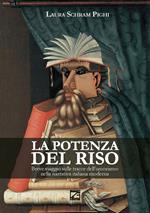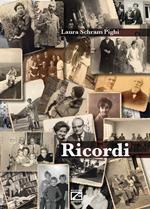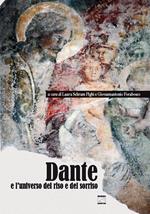 |
| Laura Pighi in her study in Verona in 2008 |
In the Netherlands, she is well known as the co-author of the Prisma Italian-Dutch dictionary, which almost all students of the Italian language in the country have used. During her lifetime, she published over 100 titles in Italian, with her last publications appearing when she was 90 years old. The most recent half a dozen books are still for sale in Italy at Liberia Feltrinelli see https://bit.ly/pighilaura and on Amazon.it.
In 2003, for example, she published an academic study on Italian utopian and travel literature, and in 2019 – when she was 89 years old - on humour in Italian literature. One of her most original works of the last years is the book on Dante and the Environment, about which she published an article in 2021. In 2015, she published “Ricordi” her memoirs which are filled with the happy memories of her life in the Netherlands. In 2020, she also published the memoirs of her father's experiences during the first world war.
Until she married in 1963 she was working as a lecturer at the University of Bologna and did her doctorate on the influence of Italian authors in France in the 18th century. After 20 years of nazi-fascism which had transformed Italy into a battlefield, there was a strong sense that international cooperation and openness was the only way forward for the country. In this period, she was active in the Federazione Universitaria Cattolica Italiana (FUCI), set up the first Italian international student association “Centro Internazionale di Accologienza Studenti Stranieri“ (CIAO) - especially for the Somalian and Ethiopian bursaries, which were part of Italy's war reparation payments - , founded AIPI "Associazione Professori di Italiano" of which she later led the Dutch chapter. With Italy emerging from over 20 years of isolation under fascism, she was also active in the European Federalist Movement, and she met the founder of the movement Altiero Spinelli personally in the early 1960s, when he resided in Bologna.
After her marriage from 1963 until 1988 she worked as a senior lecturer of Italian literature at the Italian institute at the University of Utrecht, and obtained her second doctorate in 1985 at the University of Amsterdam on the influence of French philosophy on Italian authors at the beginning of the 20th century. She was active in this institute's social and cultural life, and especially enjoyed the annual Saint Nicholas festivities. Outside the university, she contributed to the magazine "La Strada", which worked as a focal point for the large Italian migrant community at the time in the Netherlands.
For several years, she was president of the Dante Alighieri Association of Utrecht. She founded the magazine "Incontri", which now evolved into a scientific journal of Dutch scholars dealing with Italian studies. With the Dutch Open University of Television (TELEAC), she also founded ALCI "Amici Lingua e Cultura Italiana", and organized numerous Italian language courses and study trips to Italy. During these trips she grew a fondness for the Puglia and Sicily regions, part of Italy's wonderful diversity in culture.
In October 1973, she was also briefly asked to teach Queen Juliana of the Netherlands the correct way to pronounce a speech in Italian for the occasion of the visit of Italian President Giovanni Leone. A descendant of followers of Garibaldi, and not a supporter of the monarchy, she always quipped the queen had never paid for her lessons.
In the last years of her work at the University of Utrecht, together with the Vice-Rector in Bologna at the time, she managed to restore the function of hosting students from the University of Utrecht at the Collegio dei Fiaminghi at the University of Bologna. As a result of this, but also being an alumna and daughter of a former Vice-Rector of this university, she was invited at the University of Bologna’s celebration of its 900th anniversary, during which the Magna Carta Universitatum was signed which promotes academic freedom and university autonomy world-wide. Many Dutch scholars today, who specialized on Italian subjects, made use of these scholarships to do their research at the Alma Mater Studiorum, the University of Bologna, the oldest university in the world in continuous operation. After returning to Italy in 1988, she re-activated the Dante Alighieri chapter in Verona, where she started a youth chapter that aimed to make migrant children “i nuovi Veronesi” more aware of Italian language, literature and culture.
Until the end, she kept in touch with many former students from the University of Utrecht, whom she called her other children “figli di carta”. She received one of the highest orders of the Italian state “Commendatore Ordine al Merito della Repubblica Italiana” on 27 December 1988 for her work on behalf of Italian migrants and promoting Italian culture in the Netherlands. In her later years, she was President of “Viva Valpolicella” and of the environmental association “Nanuk”. In 2018, she was one of the founding members of the Negrar chapter of the Movimento Federalista Europeo.
In 1954 she became the owner of a Fiat 600, and she continued to drive until 2012. With her father, she traveled throughout Northern Italy with his Lambretta Scooter 300, and she continued to love scooters, cars and any other type of motorized transport. She loved flowers and especially orchids of which she saw many during her trip to Costa Rica in 1994. A little known fact about her is that she knew how to milk a cow, and generally was fond of gardening and farming. After a bomb of one of the first bombardments on Milan on 24 October 1943 destroyed the family home, she spent the war years as a refugee locked down on a farm in Brianza. Her father continued to work at the Catholic University in Milan for a while, but was assigned a personal fascist spy who always followed him around.
In the last years of her work at the University of Utrecht, together with the Vice-Rector in Bologna at the time, she managed to restore the function of hosting students from the University of Utrecht at the Collegio dei Fiaminghi at the University of Bologna. As a result of this, but also being an alumna and daughter of a former Vice-Rector of this university, she was invited at the University of Bologna’s celebration of its 900th anniversary, during which the Magna Carta Universitatum was signed which promotes academic freedom and university autonomy world-wide. Many Dutch scholars today, who specialized on Italian subjects, made use of these scholarships to do their research at the Alma Mater Studiorum, the University of Bologna, the oldest university in the world in continuous operation. After returning to Italy in 1988, she re-activated the Dante Alighieri chapter in Verona, where she started a youth chapter that aimed to make migrant children “i nuovi Veronesi” more aware of Italian language, literature and culture.
Until the end, she kept in touch with many former students from the University of Utrecht, whom she called her other children “figli di carta”. She received one of the highest orders of the Italian state “Commendatore Ordine al Merito della Repubblica Italiana” on 27 December 1988 for her work on behalf of Italian migrants and promoting Italian culture in the Netherlands. In her later years, she was President of “Viva Valpolicella” and of the environmental association “Nanuk”. In 2018, she was one of the founding members of the Negrar chapter of the Movimento Federalista Europeo.
In 1954 she became the owner of a Fiat 600, and she continued to drive until 2012. With her father, she traveled throughout Northern Italy with his Lambretta Scooter 300, and she continued to love scooters, cars and any other type of motorized transport. She loved flowers and especially orchids of which she saw many during her trip to Costa Rica in 1994. A little known fact about her is that she knew how to milk a cow, and generally was fond of gardening and farming. After a bomb of one of the first bombardments on Milan on 24 October 1943 destroyed the family home, she spent the war years as a refugee locked down on a farm in Brianza. Her father continued to work at the Catholic University in Milan for a while, but was assigned a personal fascist spy who always followed him around.
Although she was born and grew up during fascism, her life’s work was devoted to repairing the damage done to the international reputation of Italian culture by this movement’s warmongering, extreme nationalism, racism, and genocide, a shadow that sadly continues to hang of the country until today. She never used her academic or other titles, taking instead satisfaction from her own writings, and the growth and development of the many entities she created, her former students, and her children and grand-children. She went peacefully and as always with a smile.
References.
Four of her books, including her memoires "Ricordi" are still in print on demand available online on Italian Amazon and La Feltrinelli, with some discount.




No comments:
Post a Comment
Note: only a member of this blog may post a comment.